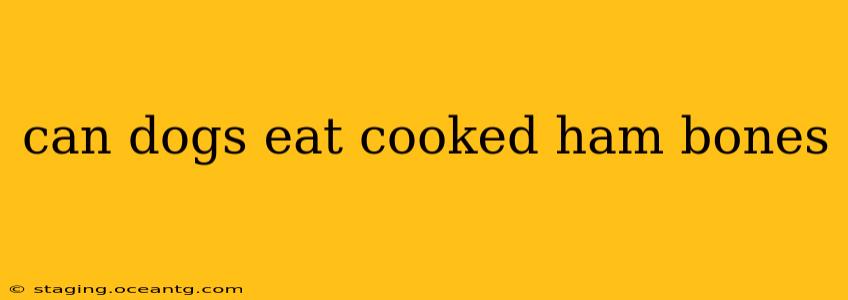Giving your canine companion table scraps might seem like a harmless way to show affection, but some foods, like cooked ham bones, can pose serious health risks. While the idea of your dog enjoying a tasty ham bone might seem appealing, the reality is far more complex. This comprehensive guide will delve into the dangers and benefits (if any) of feeding cooked ham bones to your dog, helping you make informed decisions about your pet's diet.
Are Cooked Ham Bones Safe for Dogs?
The short answer is no, cooked ham bones are generally not safe for dogs. While raw bones can sometimes be beneficial for dental health, cooked bones of any kind, including ham bones, become brittle and easily splinter. These sharp fragments can cause significant internal injuries if swallowed, leading to:
- Internal punctures: Splintered bone pieces can pierce the esophagus, stomach, or intestines, causing severe pain, infection, and potentially life-threatening internal bleeding.
- Obstructions: Bones can get lodged in the digestive tract, creating blockages that require expensive and potentially risky surgery to remove.
- Choking hazards: Large or sharp bone pieces pose a significant choking risk, particularly for smaller breeds.
What About Cooked Ham Meat?
While cooked ham bones are a definite no-go, what about the meat itself? Cooked ham, in moderation, is generally considered safe for dogs. However, it's crucial to remove all bone fragments before offering any ham to your dog. High sodium content in ham can be problematic for dogs, potentially leading to:
- Sodium Ion Poisoning: Excessive sodium intake can cause vomiting, diarrhea, increased thirst, and even seizures in severe cases. Always feed ham in small quantities and as an occasional treat, not a regular part of their diet.
What are the Alternatives to Ham Bones for Dogs?
If your dog enjoys chewing, there are many safer alternatives to ham bones that can satisfy their chewing instincts and promote dental health:
- Nylabones: These durable chew toys are designed to withstand vigorous chewing and help keep teeth clean.
- Dental chews: Many commercial dental chews are specifically formulated to help remove plaque and tartar from your dog's teeth.
- Rawhide chews: While these are popular, it's crucial to supervise your dog closely to ensure they don't swallow large pieces. Always opt for high-quality, reputable brands.
- Frozen carrots or other vegetables: These can provide a healthy and refreshing chew.
- Dog-specific chew toys: Look for durable and appropriately sized toys for your dog's breed and size.
What Happens if My Dog Eats a Cooked Ham Bone?
If your dog manages to consume a cooked ham bone, monitor them closely for any signs of distress. Symptoms such as vomiting, diarrhea, loss of appetite, lethargy, or abdominal pain require immediate veterinary attention. Do not attempt to induce vomiting at home without consulting a veterinarian.
Can Puppies Eat Cooked Ham Bones?
Absolutely not. Puppies have more delicate digestive systems and are even more susceptible to the dangers of cooked bones. Avoid giving any bones to puppies.
My Dog Swallowed a Ham Bone – What Should I Do?
If you suspect your dog has swallowed a ham bone, contact your veterinarian immediately. They will be able to assess the situation and advise on the best course of action.
In conclusion, while the allure of a tasty ham bone for your furry friend might be strong, the risks far outweigh any potential benefits. Prioritize your dog's health and safety by choosing safer and healthier alternatives for chewing and treat-giving. Always consult your veterinarian if you have any concerns about your dog's diet or if you notice any unusual symptoms.
